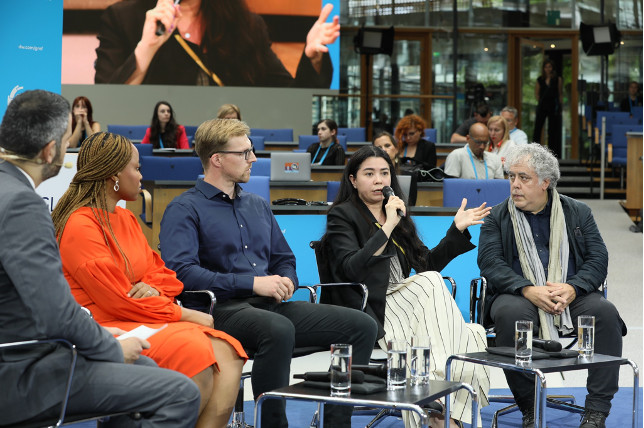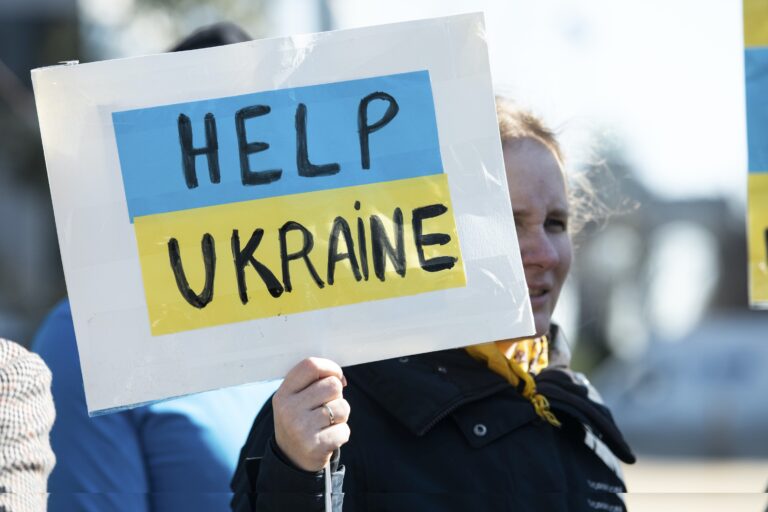
Global Media Forum: Ukraine’s role in the global media space and modern challenges
Author: Sofiia Korol
As the world becomes more and more fragmented, social groups break up into ever smaller factions, and political and ideological positions seem to become increasingly extreme, amplified by social media. The media is at the centre of this trend, having to adapt to changing audiences and deal with the conflicting voices trying to dominate public discourse.
This was the backdrop set out at last week’s 16th Global Media Forum organised by Deutsche Welle, the German public international broadcaster, in which Young European Ambassadors joined hundreds of journalists from all over the world discussing the current challenges facing the profession. The forum was held on June 19-20 at the World Conference Centre, site of the former German parliament in Bonn, Germany. This year’s conference was devoted to the theme of “Overcoming Divisions”, namely how journalism can help us in bridging the social divide.

Over two days, the forum brought together political leaders, media experts and heads of civil society organisations for a series of carefully curated, impactful discussions.
“In an increasingly fragmented society, global cooperation is more important than ever,” said DW CEO Peter Limbourg, opening the forum. “Our goal is to identify the challenges facing journalists today and bring together global media experts and policymakers. to develop and share solutions that affect the long-term prospects of journalism.”
The forum opened with a panel discussion around the subject of “50 years of Germany in the UN – Views and expectations from the Global South”, which dramatically highlighted how the world has changed since 1953, as have approaches to foreign policy in changing and competing constellations of forces.
During the discussion, speakers Melissa Fleming, UN Under-Secretary-General for Global Communications, Nobel Peace Laureate and women’s rights activist Leymah Roberta Gbowee, and Günter Sautter from the German Foreign Office, discussed how best to respond to armed conflicts and cyber-attacks in our time: do we need more dialogue as equals between the global South and North, and what is the role of the media between documenting these processes, controlling strategic information and disinformation, and promoting freedom of speech?

As the conference tackled issues ranging from “media in times of divisions” to “media between reconciliation and confrontation”, one of my favourite discussions was “Stranger in a strange land – Exile journalism on the rise”, a panel that brough together journalists Can Dündar, now in Germany after surviving an assassination attempt in Turkey and being sentenced in absentia to 27.5 years in jail, Zahra Joya, a female Afghan journalist evacuated to the UK when the Taliban took power, Fathi Osman, in French exile from Eritrea since 20212, and Anna Chaika – the latter a Ukrainian journalist now working at DW in Germany, whose words and experience particularly touched me and, I think, most Ukrainians who – like Anna and like me – were forced to leave their homes and flee from the war.
More and more journalists are being forced to leave their countries. They leave to continue working amid growing censorship and repression at home, or to report human rights abuses and corruption. Others leave to avoid imprisonment or threats to their lives and their families. This is exactly what has happened to many Ukrainian journalists.
But life in exile comes with its own set of challenges, from securing funding to staying in touch with their sources. So during the discussion, the journalists discussed how they can adapt in exile, and establish themselves somewhere between their original audience, the diaspora community and the new culture they find themselves in, in the ever-changing landscape of digital media.

Outside the plenum, there was a special exhibition, “Echoes of War – Listen to the experience of journalists”. In the parliament’s old phone booths, you could listen to the stories of DW correspondents and other journalists, sharing their experiences of reporting on the war in Ukraine, and how it affects them personally. Many of them had covered events from Ukraine long before the February 24, 2022 invasion. In this way, the organisers tried to draw attention to the events in Ukraine, and show that the war is still going on.
In the afternoons, the conference broke up into a series of smaller lectures. I chose two for myself. “How Your Newsroom Can Make a Big Difference in the Fight Against Misinformation,” hosted by reporter Teri Schultz, highlighted the work of an NGO sending journalists to schools to impart media literacy skills to a young audience. I also attended a lecture by DW trainer Viktor Pichugin, “Is it scary? Reports on the war in Ukraine”. In this session, participants could find answers to questions they would like to ask a military reporter, such as how heavy a bulletproof vest is, what it’s like to tell the stories of people who have lost everything, what journalists first do in a liberated city, and what part of the job is the most difficult.
Although the forum covered a wide range of topics, it included many discussions on war, conflict and their impact on media and journalism. Specifically, sessions focused on issues such as war reporting, conflict coverage in the media, the role of journalists in war zones, media ethics during war, and the challenges faced by journalists reporting on wars and crises.
By engaging in discussions about war and its coverage, the DW Global Media Forum contributed to a broader understanding of how the media can play a role in shaping public opinion, influencing policy and promoting peace in conflict-affected regions. The forum provided a platform for critical reflection, knowledge sharing and collaboration between media practitioners and stakeholders involved in war coverage.
The conference also raised the question of how wars affect journalism in the age of social networks, an issue tackled during a panel on “The Changing Face of War Reporting in the Age of Digital Technologies”, with multimedia journalist and filmmaker Fabian Janssen, war photographer Ron Haviv, and Ukrainian journalist and editor-in-chief of the publication Ukrainska Pravda Sevgil Musaieva.
The speakers highlighted that while digital technology and social media have created new opportunities for journalists, they also create significant challenges, with both state and non-state actors using digital channels to spread and amplify disinformation. In this new reality, today’s war zone journalists need to protect themselves from the unintentional spread of misinformation, while informing people about conflicts as they compete for attention on social media.

As a journalism student, first at the Chernivtsi National University of Ukraine, and since the full-scale invasion at St Cloud State University outside Newcastle in the United Kingdom, these discussions were incredibly stimulating, both from a professional and personal perspective, with so many echoes to my own questions and experience.
During the event, I was also able to connect with over 20 journalists, who gave me career advice and inspired me to move forward and grow in the media field. I also had the extraordinary opportunity to talk with Nobel Peace Prize laureate and women’s rights activist Leymah Roberta Gbowee and UN Under-Secretary-General for Global Communications Melissa Fleming. Since I would like to work as a political journalist in the future, hearing feedback from such people was invaluable for me.
Over more than a decade, the Global Media Forum has become a community for the exchange of thoughts, ideas and innovations in the field of media. The event provides an opportunity for professionals from around the world to come together, discuss media-related topics, and work together to find answers to the challenges facing the global media landscape.
Today, more and more media projects of Ukrainian origin are attracting the attention of a global audience, and Ukrainian journalists and media professionals deliver important messages that shape the image of our country in the world. Over two days, the Global Media Forum became a platform where Ukrainian experts and professionals could present their achievements, express their opinions and communicate with colleagues from different countries.
Yet not only were the discussions specifically relevant to the situation in Ukraine, but the presence of media professionals from all over the world, from Asia all the way to Latin America, all looking for solutions, made me realise how many of the challenges we face are truly global, and how diversity and multiplicity can become our greatest advantage and guidelines as we engage in the common struggle for information and accountability.
More campaign pages:
Interested in the latest news and opportunities?
This website is managed by the EU-funded Regional Communication Programme for the Eastern Neighbourhood ('EU NEIGHBOURS east’), which complements and supports the communication of the Delegations of the European Union in the Eastern partner countries, and works under the guidance of the European Commission’s Directorate-General for Neighbourhood Policy and Enlargement Negotiations, and the European External Action Service. EU NEIGHBOURS east is implemented by a GOPA PACE-led consortium. It is part of the larger Neighbourhood Communication Programme (2020-2024) for the EU's Eastern and Southern Neighbourhood, which also includes 'EU NEIGHBOURS south’ project that runs the EU Neighbours portal.

The information on this site is subject to a Disclaimer and Protection of personal data. © European Union,




